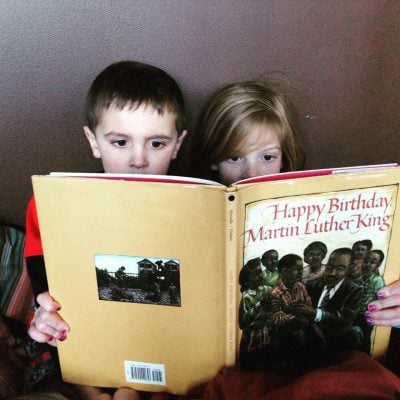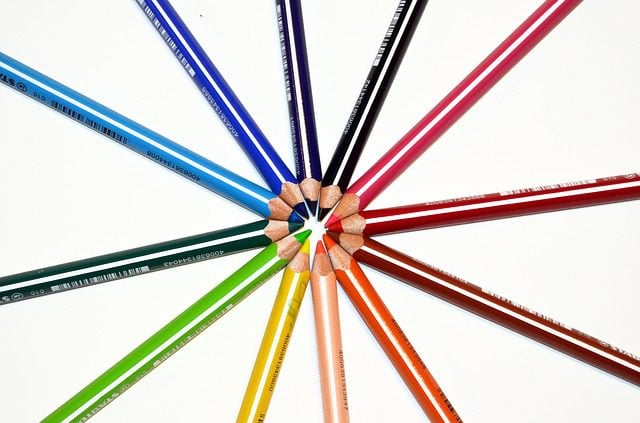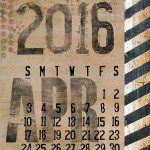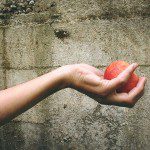My niece–my daughter’s cousin and BFF since birth–is biracial. Together, these girls choreograph synchronized dance routines and wear matching outfits and get identical toys at Christmas. And it has never once occurred to them that there is any difference between them. That to some people’s eyes, they do not look like family. I’ve always been grateful that skin color is not even on the radar for them.
Maybe at some level, I thought the depth of that relationship could take the place of difficult conversations about race. That her closeness to a person with darker skin would teach her all she needs to know about justice and equality. But now I know otherwise. Let’s talk about why that’s not enough.
Last year, my daughter came home from school (Kindergarten) telling me all about Martin Luther King, Jr. She sang a little song, and told me the story; we talked about water fountains and buses, and what is fair and what is not. I was impressed that they were starting this in public school so early. So we went right to the library and got some books about MLK and the civil rights movement. And this year, for Black History Month, we did the same thing.
More recently, the kids have overheard us talking about Donald Trump. Why don’t we want him to be president? Oh, kidletts…where to begin? I have tried to explain that some people who like Trump, want things to be more like they used to be… like back in MLK’s time. I know that is not entirely accurate, and is utterly lacking in nuance… But it was the best way I could think to help them understand, in the context of a history they sort of know about.
“Sort of” turned out to be a critical distinction.
Last Friday. I was picking my daughter up from school, and she came out chatting with friends as usual. On the walk home, she tells me that she was talking to one of her friends [who is African American] about Donald Trump. Uh-oh.
“So I told her,” she said, “If Donald Trump is President and everything is like MLK times again, I told her not to worry… I will take good care her.”
Hmmm… I had to process that for a minute. The sentiment may be admirable. But beneath the first grade understanding of civil rights, there lies an uncomfortable assumption that, if this whole democracy thing falls apart, we will be the ones holding the cards. We will be the ones empowered to “take care of” (or not) the people whose rights have been removed. We will be called to kindness and compassion, by virtue of our authoritative place in history. But not to worry–because we will not abuse that power like people in the past have done.
And that’s privilege in a nutshell, isn’t it? The misconception that we can somehow be free when others are not. That we can learn to accept some inevitable inequality, as long as we are kind about it.
In that moment, which thread do you start pulling at first?
First off, some further conversation revealed that she has confused elements of the Civil Rights movement with elements of the Civil War. So there’s that.
“And anyway,” says my husband, after the history lesson “that’s not going to happen. He’s not going to be President. No way. You don’t have to worry about that.”
“And also,” I said–working to extract the larger point from the confusing political stuff– “If you really want to take care of people–and I’m glad that you do–then what we really want is for everyone to have all the same chances, all the same rights…that’s the only way it can ever be fair. That way is better for everybody.”
It’s not her fault. Her heart–her huge, 7-year-old, vegetarian heart–was clearly in the right place. Hey, if the world goes all to hell and the bad people get in charge, I’ll take care of my people! I get it. But it also alerted me to a major mom fail… While I have talked to my kids about racism and equality, I have failed address privilege. The thousand little ways that the world is made easier for them than it is for their cousin, and some of their friends…
Really, isn’t that the story of life in this country? We thought we had stamped out racism because the law has made things “fair,” and we all are best friends some days, and everything is “nice” and “fine.”
Enter Donald Trump and his minions, and all hell breaks loose. The sludge of bigotry dredged up from the bottom of the pool. We can’t ignore this part of our narrative any more.
So maybe we should thank him? As absurd as that sounds, maybe we should be moderately grateful for the wake up call this whole fiasco is providing. For the invitation to deeper, more difficult conversations with our children and youth.
As I talked to my daughter the other day, I had an epiphany of time and space. Yes, she had distorted a couple of major moments in history…but the biggest gap in her education was not a missing piece of the past–it was missing pieces of present reality that really confused her. When we talk about rights and freedom, she is thinking just about the law of the land; but what we are really talking about is the subconscious of an entire culture.
To that end, I’m rounding up resources for talking to kids of all ages about race and privilege. About real history–and what justice looks like in real time.
It will be hard. It will be awkward. You’d better believe we are going to screw this up. But we can’t just trust that our kids’ relationships with people of color will teach them everything they need to know. We can’t just assume that by the time they are grown up the world will have moved past all this.
Here’s the best of what I’ve found so far. We’ve got work to do, folks. Glad to be doing it with you.
Check out Raising Race Conscious Children: Resources at Raceconscious.org
A historic experiment still resonnates, on this episode of Frontline.
Embracerace.org is “an emerging, multiracial, online community of parents, teachers, and other caring adults striving to engage race in a healthy, constructive and courageous way.”
Rethinking Schools, resources for teachers.
Freedom Summer, an award-winning children’s book about two friends in the South in 1964.
Many, many people have recommended the Invisible Knapsack exercise by Peggy McIntosh. (This is great for youth group or classroom activity. Here’s another simple one, using a recycle bin.)
Raceandfaith.com offers some conversation starters for family and friends.
What is Privilege? –a short but powerful video (could also be a group activity) to explore different kinds of privilege, and how it influences our life choices.
And of course, we can’t really talk to children and youth about privilege unless we are also learning and working, ourselves. Check out this Goodreads list of Books White People Need to Read.
And we are just getting started! What else do we need to know about? I would love to hear your own experiences, or favorite resources, for conversation with kids about race, privilege and equality.














